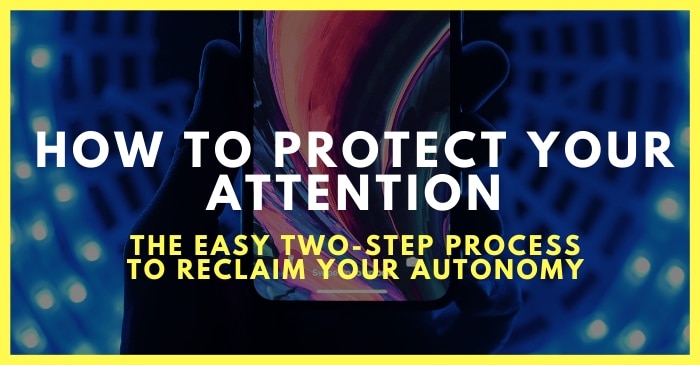In ancient times, having power meant having access to information. Today, having power means knowing what to ignore. —Yuval Noah Harari
THE IMPORTANCE OF ATTENTION
My experience with attention is that it’s my most valuable resource. It’s even more valuable than my time because the quality of my time depends on the quality of my attention. Low-quality attention diminishes a moment and higher-quality attention improves it.
I’ve also noticed that energy flows where my attention goes. If I’m distracted or lost in thought and unaware, I fall into unnecessary, self-imposed suffering. From this space, I’m unable to recognize new possibilities and alternative choices. Likewise, if my attention is focused and clear, I feel generally optimistic, excited, peaceful, present and expanded.
I wonder for all of us: what would our lives be like and how would the world change if we could manage our attention more skillfully? What if, instead of staying lost in thought, we could turn our attention to the things that truly benefit us most?
Here lies the test of the 21st century: to protect and cultivate our attention. Success means peace, presentness and expansion of consciousness and failure means distraction and unnecessary self-imposed suffering. So how do we harness attention? We dive deeper into understanding how attention works, knowing what to ignore, getting clear on what to focus on, and beginning the journey.
WHAT IS ATTENTION?
Attention is psychic energy by which we can importance to any sensory experience through the five senses, including sight, sound, smell, taste, touch and bodily sensations. In every moment, attention flows somewhere in our experience, and it’s up to us where to place it. Therefore, it’s best to use attention skillfully for higher quality experiences of the present moment.
Also, it’s important that those with attention deficits not allow such diagnoses to be set in stone. I believe that attention is a phenomena that’s heavily misunderstood. I believe that:
Attention is a trainable skill. No matter what your starting baseline might be, our ability to pay attention can be practiced and improved. Consider the neuroplasticity of the mind, how it’s constantly changing, open to re-wiring, and thus improvement. Every day, the brain generates 100 new neurons. Your behavior determines the neurological pathways in the brain. The mind is not set in stone.
We were never taught how to pay attention. Growing up, most of us were told to do something we never actually understood how to do. Being told to “pay attention” does not improve our ability to do so, which brings us to the two steps we must act on to cultivate attention:
- Knowing what to ignore (and reducing the likelihood/effects of this stimuli)
- And knowing what to focus on (and practicing returning to this stimuli)
Together, these form an endless feedback loop that either direct our attention towards or away from our desired task.
KNOWING WHAT TO IGNORE
There’s lots of articles about how to ignore the supposed “less important” elements of our experience. I’ll mention some of those examples below, but I think the real work begins with the latter part: intentionally cultivating the skill of attention. Otherwise, no matter how much we reduce our less desired information sources, we still won’t be able to keep focused without an intentional practice for developing attention.
Before we get to our practice, here’s some low-hanging fruit for possible stimuli reduction:
1. The News of the Day
Contrary to popular belief, being “informed” about the 24/7 news cycle offers little value to the individual. Quite the contrary. It merely offers an unrealistic representation of reality, which many might believe should be the sole purpose of “keeping informed”, to cultivate a greater understanding of reality.
If anecdotal news and breaking stories were someone’s only source of information into the outside world, one might believe that murder, terrorism, and police killings are the greatest dangers we face. They wouldn’t even bother to look up the statistics, much less experience the world for themselves.
We hate to hear about such experiences, but if we look at statistics, it’s clear we are our own worst enemy. The top nine causes of death in 2017 in the US were disease-related. Number 10? Suicide. It turns out that the greatest risk to our health, well-being, and longevity are internal factors, each mitigated by improving diet, exercise, and mental health.
2. The Phone (& Other Screens)
I won’t go too deeply into this because we all know that we could likely use less attention given to phones. But knowing and practicing are very different things.
Here are a couple tips to manage your attention away from the phone:
* Turn off the phone’s notifications. Get rid of the red bubbles.
* Keep the phone on “Do Not Disturb” mode. The sounds and vibrations become mindless reflexes and cues that divert our attention unnecessarily. Without them, it is now your internal choosing to look at your phone and not being unwillingly prodded by the needs of others.
*Leverage the Grey scale. Set your phone’s color options to grey scale, which will make the colors appear black and white. It makes looking at social media way less interesting.
*Opt into Airplane mode. This will keep you from being unnecessarily disturbed. This allows you to check your phone in more intentional ways, one that’s under your control.
3. The Outside Environment
Many people believe that their outside environment controls their attention, that changing their surroundings is the only way to improve their ability to pay attention. There is no doubt we must contend with the outside world, but it is nothing more than a training ground to help us improve our attention. The external world can be reframed internally so that every distraction is actually a test. Attention is fully capable of being cultivated even during the most volatile times. Imagine a basketball player hitting clutch free-throws in the final seconds of a game as a crowd does their best to distract them.
Upon close investigation of the conscious experience, there must be a perceiver who interprets an environment. This means the environment is not the same for everyone. Just as someone can incite sexual passion within you but incites anger in another person, one environment can be perceived in infinitely different ways. You, the individual, are the one who interprets how the outside environment affects you.
CULTIVATING ATTENTION
Since we can’t control the things outside of us, our best strategy is to place a high importance on controlling the things inside of us. We must re-frame attention as our personal responsibility and something we have absolute control over. Think: I allow myself to become distracted.
As previously discussed, we were often told as children to “pay attention” but with little direction on how this should be accomplished. And even if we know what to ignore, we often fall into the same traps because there’s something missing from the equation. Part two of this solution is in developing the skill of attention by isolating this variable via meditative practices.
MEDITATION AS A MEANS TO IMPROVE ATTENTION
Meditation is the act of cultivating different states of mind. An attentive mind is one of them. When I practice meditation and remove external variables from my experience, I’m better able to isolate the single variable of attention and thus feel more attentive.
That said, meditation doesn’t just help improve my attention. There are many deeper aspects of meditation’s goals including dis-identification with the self, self-knowledge, and full enlightenment that extend far beyond cultivating attention. But if improving attention can help reduce unnecessarily self-imposed suffering, then practicing just one aspect of meditation’s side-benefits would be time well spent.
You can meditate in this very moment. Essentially, pick a single point of focus, attempt to keep it there, and when the mind wanders, return your attention to the chosen area of focus.
Attention can be trained with any object, but the most practical way to train attention is by sitting down with your closed eyes and focusing attention entirely on the breath as it goes in and out of the nostrils. Narrowing the area of awareness will sharpen attention.
When you find yourself lost in thought, bring yourself back to the area of awareness as gently as possible. Avoid self-abuse when returning to the breath. Instead, be happy that you caught yourself. That is the practice, after all. Catching yourself in thought and realizing that you are thinking then returning to the practice is the mental “bicep-curl” to work out the mind and improve attention.
The goal isn’t to be “free from thought” or to stop thinking entirely. The goal is to become aware when thoughts arise, observe the thoughts objectively, and accept them. We can’t control our thoughts but can condition our response to them. Resistance to thought just causes more self-imposed suffering.
THE BEGINNING OF THE JOURNEY
Cultivating attention is one quality of many that can help reduce unnecessary, self-imposed suffering. There are many others such as practicing loving-kindness, vulnerability, morality and looking inward. I hope to write more about these in the future. In the meantime, I wish you happiness during your work with improving attention and thus your overall quality of time spent.





2 Comments
Leave your reply.